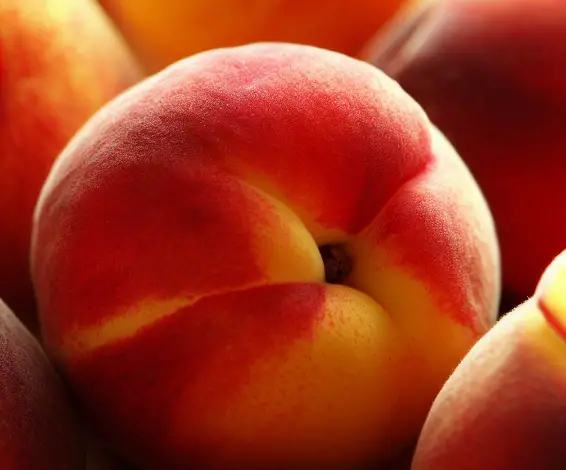Are Peaches Good for You? Here’s What You Need to Know

Peaches are sweet, juicy fruits that are relatives of plums, cherries, and apricots in the Rosaceae family.
Originating from China more than 8,000 years ago, they have since spread worldwide. People love peaches for their delicious flavor and beautiful color.
Knowing the health advantages of peaches is important because they’re full of nutrients that are good for your health. They can help your digestive system, make your immune system stronger, and offer many other benefits.
Table of Contents
- Are Peaches Healthy?
- What’s In a Peach? Nutrients Explained
- The Many Health Benefits of Peaches
- 1. They Help Your Digestive System
- 2. They Strengthen Your Immune System
- 3. They’re Good for Your Heart
- 4. They Help With Weight Control
- 5. They Make Your Skin Healthier
- 6. They Might Help Prevent Some Cancers
- Peaches’ Nutritional Facts
- Peaches and Their Antioxidants
- How Peaches Support Digestive Health
- Peaches and the Immune System
- Keeping Your Heart Healthy With Peaches
- Peaches Can Help You Manage Your Weight
- Peaches are Good for Your Skin
- Peaches Might Help Protect Against Cancer
- How to Add Peaches to Your Meals
- Be Mindful of Side Effects and Take Precautions
- 1. Some People May Be Allergic to Peaches
- 2. Peaches Can Have Pesticides
- 3. Eat Different Fruits for Balance
- Conclusion
- FAQs
- Can peaches help with weight loss?
- Are canned peaches as nutritious as fresh peaches?
- Can I eat peach skin?
- Are there any peach varieties with higher nutritional value?
- Can peaches cause allergic reactions?
Are Peaches Healthy?
Yes, peaches are healthy. They have few calories but are full of fiber and nutrients like vitamins, minerals, and antioxidants. They can help your digestive system, immune system, heart health and weight management, and can even make your skin better.
What’s In a Peach? Nutrients Explained
Let’s look at what peaches have inside them. They are not heavy in calories or fat and are packed with vitamins, minerals, and antioxidants.
Peaches have carbohydrates and proteins, but almost no fat. They also have a lot of fiber, which helps with digestion and makes you feel full.
Peaches are full of vitamins like vitamin C, vitamin A, and vitamin E. These are important for keeping your immune system working well, helping you see better, and protecting your cells from damage.
They also have minerals such as potassium, magnesium, and phosphorus, which help your heart and bones stay strong.
The Many Health Benefits of Peaches
1. They Help Your Digestive System
With lots of fiber, peaches support a healthy digestive system. Fiber helps keep your bowel movements regular and can prevent constipation. Eating peaches can help you have a healthy gut and avoid digestive problems.
2. They Strengthen Your Immune System
Peaches are great for your immune system because they have a lot of vitamin C. This vitamin helps your body make more white blood cells that fight off infections and sickness. Eating peaches regularly can make your immune system stronger and keep you healthy.
3. They’re Good for Your Heart
With potassium in them, peaches can help control your blood pressure. This can lower your risk of heart disease. The fibers in peaches can also help reduce cholesterol, which is good for your heart.
4. They Help With Weight Control
Peaches can help you lose or manage your weight. They don’t have many calories and the fiber in them helps control your hunger. Eating peaches can reduce your cravings and help with weight control.
5. They Make Your Skin Healthier
Peaches have antioxidants like vitamin C and vitamin E which are good for your skin. They help protect your skin from damage and keep it looking young and fresh. Peaches also have a lot of water, which keeps your skin hydrated.
6. They Might Help Prevent Some Cancers
The antioxidants in peaches, like chlorogenic acid and lutein, might help lower the risk of some cancers. They fight free radicals and can stop cancer cells from growing. Eating peaches might help with cancer prevention, although more research is needed.
Peaches’ Nutritional Facts
A medium peach has about 60-70 calories, which makes it a good snack for those who count calories. Peaches also have about 2-3 grams of fiber per fruit, which helps with digestion and feeling full.
Peaches and Their Antioxidants
Antioxidants are important for your health because they protect your cells from damage. Peaches have antioxidants like vitamin C, vitamin E, and polyphenols. These help fight off cell damage, reduce inflammation, and can lower the risk of diseases like heart disease and cancer.
How Peaches Support Digestive Health
The fiber in peaches is good for you because it helps with digestion. It makes stools bulkier, softer, and moves them through the digestive tract. This can help you avoid constipation and other digestive problems, ensuring a healthy digestive system.
Peaches and the Immune System
Vitamin C boosts your immune system, and peaches are full of this vitamin. It helps your body produce more white blood cells, makes your immune system stronger, and protects you from getting sick. Adding peaches to your diet can give your body a natural way to fight off illness.
Keeping Your Heart Healthy With Peaches
Peaches are a good source of potassium, which is important for your heart’s health. It helps keep your blood pressure in check and lowers the risk of problems like strokes. Eating peaches can help keep your heart working well.
Peaches Can Help You Manage Your Weight
If you want to lose weight or keep it off, you might find peaches helpful. They have few calories, no fat, and lots of fiber. The fiber in peaches helps you feel full, so you’re less likely to snack and eat too much. This can be great for controlling how much you eat and for keeping your calorie intake low.
Peaches are Good for Your Skin
Peaches have antioxidants like vitamins C and E, which are good for your skin. They protect your skin from damage by fighting off harmful stuff called free radicals. This can help keep your skin from aging too fast and fix other skin problems. Regularly eating peaches can keep your skin moist, smooth, and looking young.
Peaches Might Help Protect Against Cancer
Even though peaches can’t promise to stop cancer, they have things in them that might help prevent it. Their antioxidants, like chlorogenic acid and lutein, might fight cancer. They work by getting rid of free radicals and stopping cancer cells from growing, which might lower the risk of getting some cancers.
How to Add Peaches to Your Meals
It’s easy and fun to include peaches in your food. Here are some ways to do it:
- Eat fresh peaches on their own for a quick treat.
- Put peach slices on your breakfast cereal or oatmeal.
- Make smoothies with peaches for a tasty, healthy drink.
- Add peaches to salads for a sweet touch and some color.
- Grill peaches to create a yummy and good-for-you dessert.
- Try making recipes with peaches like jam, salsa, or fruit salad.
By eating peaches, you can enjoy their health benefits and their sweet flavor.
Be Mindful of Side Effects and Take Precautions
Peaches are usually safe to eat, but there are a few things to watch out for:
1. Some People May Be Allergic to Peaches
People can be allergic to peaches, which can cause minor problems like itching or swelling, or serious issues like trouble breathing. If eating peaches bothers you, it’s best to talk to a doctor.
2. Peaches Can Have Pesticides
Peaches might have pesticides on them if they’re not organic. You can wash the peaches well or buy organic ones to cut down on pesticides. Peeling off the peach skin can also help to take away more of the pesticides.
3. Eat Different Fruits for Balance
Peaches are good for you, but you should also eat other fruits and veggies to get all the nutrients you need. Eating too much of any one thing isn’t good, so balance is important.
Conclusion
Peaches are tasty and healthy. They are low in calories and filled with vitamins, minerals, and antioxidants. They can support your digestion, heart, and skin health. Eating peaches can be a simple way to improve your overall health.
So, when you’re shopping, remember to pick up some fresh and juicy peaches. They’re good for both your health and your taste buds!







